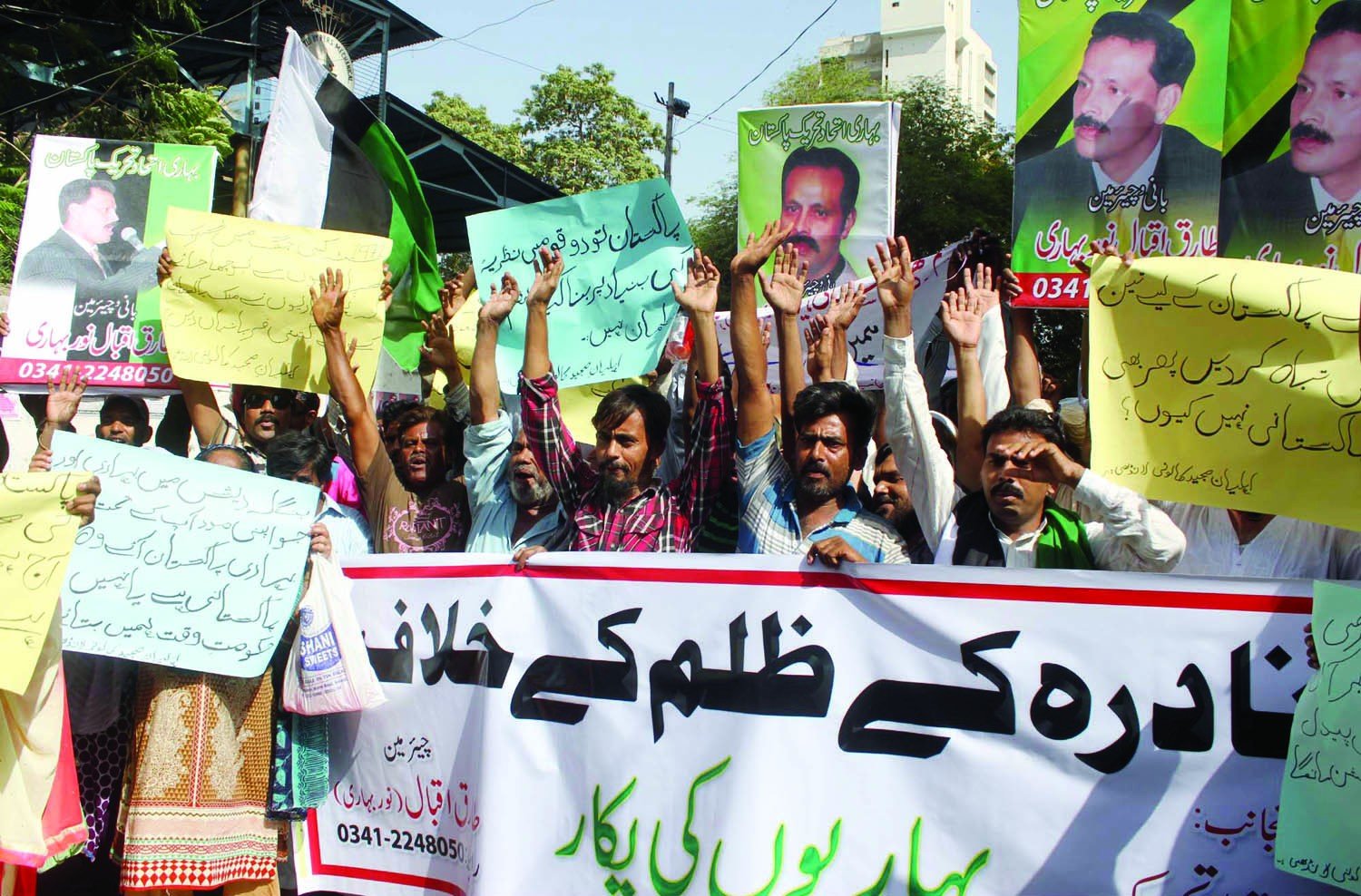
The CNICs of tens of thousands of Biharis have either been blocked or not renewed for several years, putting their status as Pakistani nationals into question

Outside almost every office of the National Database and Registration Authority (Nadra) in Karachi, one can see people of various ethnic and linguistic backgrounds complaining about the troubles they face in acquiring their Computerised National Identity Cards (CNICs).
A significant number are those or children of those migrants who came to Karachi from East Pakistan to settle after the fall of Dhaka on December 16, 1971. The CNICs of tens of thousands of those migrants, known as Biharis, have either been blocked or not renewed for the past several years. When they approach Nadra, they are asked to show documents issued between 1970 and 1979, such as the repatriation certificate and ration card.
Abid Ahmed, a 34-year old resident of Karachi’s Majeed Colony, a low-income neighbourhood in Landhi area, is among the people whose CNIC expired two and half years ago and Nadra has refused to renew his registration as a Pakistani citizen. Since then, Ahmed has remained unemployed because wherever he goes to seek a job, his potential employers demand an identification document.
Ahmed’s parents are among those hundreds of thousands of people who suffered twice because of the partition -- first in 1947 and then in 1971. While most of the Muslims from Indian provinces, such as Uttar Pradesh and Punjab moved to West Pakistan, Muslims from Bihar migrated to East Bengal (then East Pakistan and now Bangladesh) because it was geographically much closer than West Pakistan.
Ahmed’s father, Qutab, who goes by a single name and is around 79, remembers the double migration in the two partitions. "I was around seven or eight in 1947. My father used to work in a locomotive factory in Bihar, north India. We crossed the Biral border to enter East Pakistan," he tells TNS. He says, "after living in East Pakistan for 15 years, the situation started worsening for Urdu-speaking non-Bengalis (or Biharis), especially on the issue of language, and Bengali nationalist parties in East Pakistan started a hate campaign against the dominance of West Pakistan.
"In the 1970 general election, Biharis supported the pro-West Pakistan political party, especially the Jamaat-e-Islami rather than the Bengali nationalist party, the Awami League. After that, Bengali nationalist groups started a movement for separating East Pakistan from West Pakistan and began to attack the Bihari community for supporting West Pakistan."
After the fall of Dhaka and creation of Bangladesh, around half a million Biharis who had chosen to stay behind in former East Pakistan kept coming to Pakistan gradually because of the violence in the newly created Bangladesh.
In 1974, the Pakistani government decided to absorb migrants from East Pakistan. Though the government repatriated about 170,000 Biharis back to Pakistan in three phases between 1972 and 1992, each time it was done with great reluctance.
"Only those who arrived in 1974 under the repatriation agreement had repatriation certificates. Others, who came afterwards till the early 1980s, were not given any such document," Feroz Khan, Majeed Colony Union Committee Chairman, a Bihari majority neighbourhood in Karachi, tells TNS.
A large majority of the Biharis who migrated to Pakistan chose to settle in Karachi. The government had attempted to rehabilitate them in other provinces but nearly all of them gradually moved to Karachi, largely because of family connections.
Most of the Bihari population of Karachi reside in various areas of Orangi Town, Majeed Colony, Sector 36-B Landhi, Korangi, Bahadurabad, New Karachi and Surjani Town areas.
They are facing a host of problems; the most glaring are not being able to get CNICs, denial of job opportunities and other usual perks of being a Pakistani national. For instance, they can’t open bank accounts, buy cars or get them registered or buy any property.
Khan, the UC chairman, says that most residents of his constituency were Biharis who have educated their children. "The parents have old CNICs but Nadra is neither renewing their identity cards nor issuing documents to their children," he says.
The Muttahida Qaumi Movement has long been pressing for the issuance of CNICs to Biharis. "They are genuine and legitimate people who came to Pakistan in the early 1980s. They rendered enormous sacrifices for the one Pakistan cause and fought against the Mukti Bahini," says Syed Aminul Haq, an MQM-P MNA who was elected from Orangi Town. He says that despite several assurances, "the community is still facing problems at the hands of Nadra officials".
Meanwhile, Nadra officials in Karachi confirm the registration authority has intensified its exercise of identifying "aliens" among the CNIC holders. Hence, the authority has either blocked or refused to renew thousands of CNICs because of their "suspicious" status. A senior official of Nadra who wants to stay anonymous, tells TNS that the registration authority has been asking the Bihari community to show government documents issued in the early 1980s, including the repatriation certificate and ration card.
Because of the pressure from the community in Karachi and from various political parties, especially the MQM-P, the previous government of the Pakistan Muslim League-Nawaz had formed an 18-member special parliamentary committee in January 2017 to resolve the issues of CNICs of the Bihari community as well as the Bengali community, who migrated before or after the fall of Dhaka and are living in Karachi since then. The committee chaired by the then deputy speaker of the National Assembly, Murtaza Javed Abbasi, held meetings to suggest a way forward for the re-verification of blocked ID cards. But in May 2018, the government changed and the issue of denial of CNICs still persists.